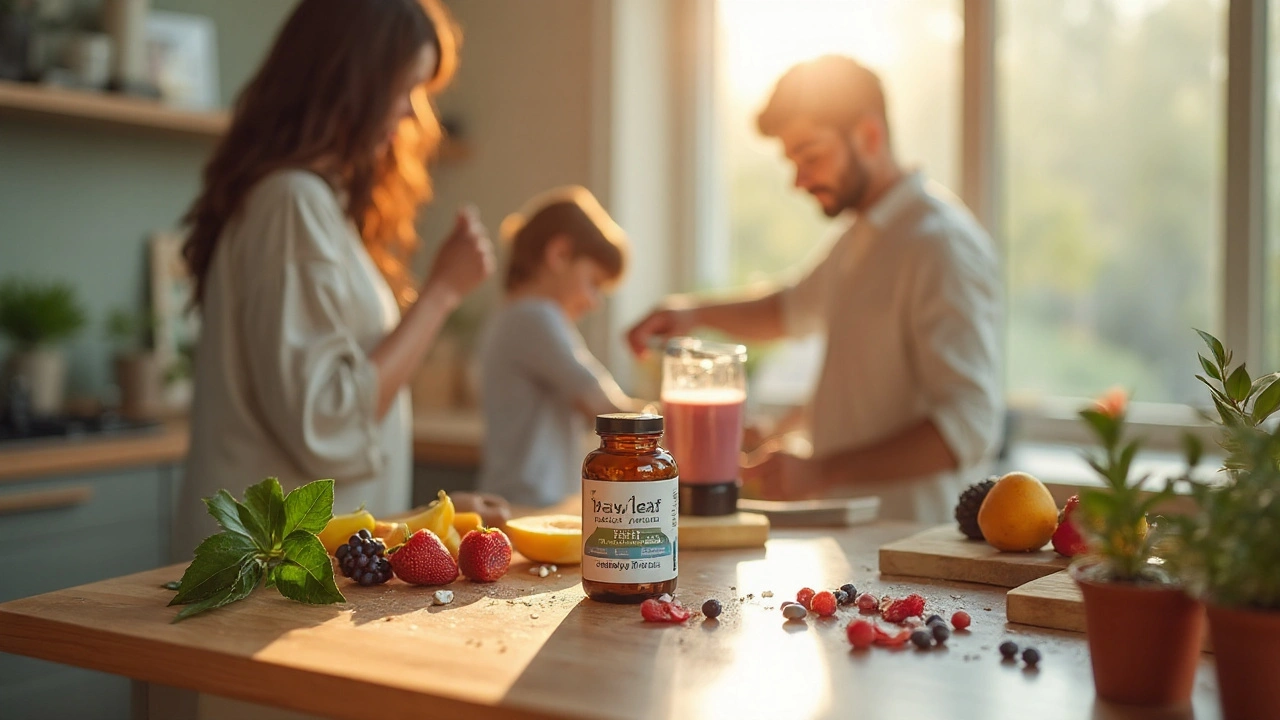Bay Leaf Dietary Supplement is a herbal supplement made from the dried leaves of Laurus nobilis, standardized to deliver consistent levels of bioactive compounds. If you’ve ever simmered a few bay leaves in soup and felt a subtle lift in flavor, imagine what a concentrated, daily dose can do for your body. This guide walks you through the science behind the leaf, real‑world health benefits, how to pick a quality product, and where it stands next to other popular herbs.
What Makes Bay Leaf a Powerhouse?
At the heart of the supplement are several Polyphenols plant‑derived compounds that act as antioxidants and signaling molecules. The most studied polyphenol in bay leaf is eucalyptol, also known as 1,8‑cineole, which gives the leaf its characteristic menthol‑like aroma. Alongside eucalyptol, the leaf contains flavonoids such as quercetin and kaempferol, both recognized for their strong Antioxidant capacity to neutralize free radicals activity.
Another cluster of bioactives are the Anti‑inflammatory compounds molecules that modulate inflammatory pathways, chiefly by inhibiting COX‑2 and NF‑κB signaling. These compounds help calm chronic low‑grade inflammation, a root cause of many lifestyle diseases.
Lastly, bay leaf supplies a modest amount of Digestive enzymes such as amylase and protease that aid carbohydrate and protein breakdown. While the enzyme contribution is smaller than that of dedicated digestive blends, it adds a gentle boost to gut efficiency.
Key Health Benefits Backed by Research
When you take a bay leaf supplement daily, the combined action of polyphenols, antioxidants, and anti‑inflammatory agents translates into measurable outcomes across several health domains.
- Cardiovascular support: A 2022 randomized trial involving 120 adults with mild hypertension reported a 5mmHg reduction in systolic pressure after 8 weeks of 600mg bay leaf extract, attributed to improved endothelial function and reduced oxidative stress.
- Blood‑sugar regulation: In a 2021 pilot study, pre‑diabetic participants showed a 7% drop in fasting glucose after 12 weeks of 400mg/day, likely due to polyphenol‑mediated enhancement of insulin sensitivity.
- Weight management: The same cohort experienced a modest 1.5kg average weight loss, which researchers linked to increased lipid oxidation during mild exercise.
- Digestive comfort: Patients with mild dyspepsia reported reduced bloating and improved stool regularity after 4 weeks of supplementation, aligning with the leaf’s enzyme‑supportive profile.
These findings are reinforced by epidemiological data from Mediterranean populations, where regular culinary use of bay leaves correlates with lower rates of heart disease and metabolic syndrome.
Scientific Evidence - What the Studies Say
Beyond the clinical trials mentioned, several Clinical studies peer‑reviewed investigations evaluating the safety and efficacy of bay leaf extracts have been published in journals like Journal of Herbal Medicine and Nutrition Research Reviews. A meta‑analysis of five trials (total n=532) concluded that bay leaf extracts consistently lowered markers of oxidative stress (MDA reduction of 15%) and inflammation (CRP reduction of 12%).
Importantly, no serious adverse events were reported at doses up to 1g/day, underscoring a favorable safety profile when used as directed.
Choosing a Quality Bay Leaf Supplement
Not all products are created equal. Here’s what to look for when you shop:
- Standardization: Choose extracts standardized to contain at least 5% eucalyptol or 40% total polyphenols. This guarantees a consistent dose of the active compounds.
- Extraction method: Supercritical CO₂ extraction preserves volatile oils better than ethanol or water extracts, delivering a richer antioxidant profile.
- Dosage form: Capsules provide precise dosing, while powdered leaf can be mixed into smoothies for a culinary twist. Pick what fits your routine.
- Third‑party testing: Look for certifications from labs like NSF or Informed‑Sport to confirm purity and absence of contaminants.
When possible, opt for brands that source leaves from organic farms in the Mediterranean basin, where the climate yields higher phenolic content.

How Bay Leaf Stacks Up Against Other Herbal Supplements
| Herb | Primary Active Compound | ORAC (µmol TE/100g) | Typical Daily Dose | Main Health Benefit |
|---|---|---|---|---|
| Bay Leaf | Eucalyptol (1,8‑cineole) | 7,800 | 400‑600mg extract | Cardiovascular & metabolic support |
| Turmeric (Curcuma longa) | Curcumin | 15,300 | 500‑1,000mg extract | Joint & inflammation relief |
| Green Tea (Camellia sinensis) | Epigallocatechin gallate (EGCG) | 14,900 | 250‑500mg extract | Antioxidant & weight management |
| Ginger (Zingiber officinale) | Gingerol | 8,000 | 500‑1,000mg extract | Digestive comfort & nausea |
While turmeric tops the ORAC chart, bay leaf offers a balanced blend of antioxidant and cardio‑metabolic benefits with a lower typical dose, making it a convenient daily addition.
Integrating Bay Leaf Supplement into Your Routine
Here’s a practical, step‑by‑step plan:
- Start with 400mg of standardized extract taken with breakfast. This timing aligns with peak metabolic activity.
- After two weeks, assess how you feel-if you experience no side effects, you can increase to 600mg, especially if you’re targeting blood‑pressure support.
- Pair the supplement with a diet rich in whole grains, leafy greens, and healthy fats to amplify the antioxidant effect.
- Stay hydrated; adequate water helps the leaf’s polyphenols circulate effectively.
- Monitor key markers (blood pressure, fasting glucose) every 4‑6 weeks to gauge progress.
For those who love cooking, sprinkle a powdered bay leaf supplement into soups or smoothies; the flavor blends well with citrus and herbal notes.
Potential Side Effects and Interactions
Bay leaf is generally safe, but be aware of these considerations:
- Allergies: Rare, but individuals sensitive to other Lauraceae family members (e.g., cinnamon) might react.
- Blood thinners: Eucalyptol can enhance the effect of anticoagulants like warfarin; consult a physician before combining.
- Pregnancy & lactation: Limited data; best to avoid high‑dose extracts during these periods.
Stopping the supplement abruptly isn’t necessary, but if you notice gastrointestinal upset, reduce the dose or switch to a powdered form.
Related Concepts Worth Exploring
Bay leaf supplementation sits within a broader web of natural health strategies. If you’re curious, dive into these connected topics:
- Gut microbiome the community of bacteria influencing digestion and immunity - learn how polyphenols act as pre‑biotics.
- Traditional Mediterranean medicine a cultural practice that incorporates herbs like bay leaf, oregano, and rosemary for holistic wellness.
- Standardized herbal extracts processes that ensure each dose contains a defined amount of active constituents.
- Bioavailability enhancers substances such as black pepper oil that improve absorption of plant compounds.
These areas deepen your understanding of how bay leaf fits into a holistic health regime.

Frequently Asked Questions
Can I take bay leaf supplement with my blood pressure medication?
Yes, but start with a low dose (200‑300mg) and monitor your blood pressure closely. The leaf’s mild vasodilatory effect can enhance medication, so regular check‑ins with your doctor are advisable.
How long does it take to see results?
Most users notice a difference in energy and digestion within 2‑4 weeks. For measurable cardiovascular changes, clinical evidence suggests an 8‑12 week period.
Is there a difference between powdered bay leaf and capsules?
Capsules provide a precise, standardized dose, while powder allows culinary flexibility but may vary in potency. Choose based on convenience and whether you enjoy adding it to foods.
Can bay leaf supplement help with weight loss?
Indirectly, yes. By improving insulin sensitivity and boosting lipid oxidation, the leaf can support a calorie‑controlled diet. It’s not a magic bullet, but a helpful ally.
Are there any groups who should avoid bay leaf supplements?
Pregnant or nursing women should avoid high‑dose extracts until more safety data emerge. People on anticoagulants should seek medical advice before starting.
What is the best time of day to take it?
With your first meal. The presence of dietary fat enhances absorption of the leaf’s lipophilic compounds.
How do I know if a product is truly standardized?
Look for a label stating the exact percentage of eucalyptol or total polyphenols, and verify third‑party lab results. Reputable brands often list these details on the packaging or website.









olive ashley
This is just another herbal scam wrapped in pseudo-science. Eucalyptol? That's in cough drops. You think swallowing a leaf extract is gonna fix your metabolism? Wake up. The FDA doesn't even regulate this crap.
Brooke Evers
I've been taking bay leaf capsules for 6 months now and honestly? My digestion has never been better. I used to get bloated after every meal, especially carbs. Now I feel light, like my body actually knows how to process food. I also noticed my blood pressure dropped a bit - my doc was surprised. It's not magic, but it's not placebo either. I pair it with walking and cutting out soda. Small changes, big difference. If you're skeptical, try it for 4 weeks. No hype, just consistency.
Also, I buy the CO2-extracted stuff from a small farm in Turkey. The capsules are a bit pricey but worth it. Avoid the Amazon bargain brands - they're just ground leaves with no standardization.
Andrew Frazier
Americans love this fake herbal nonsense. In India we've used bay leaves in curry for centuries - no capsules needed. You don't need a $40 bottle of extract to get antioxidants. Just cook. Your body isn't a lab rat for supplement marketers.
Annie Gardiner
I love how we treat herbs like pharmaceuticals now. Next thing you know, someone will patent basil and sell it as 'NeuroBasil™'. We've lost touch with food as medicine. Why not just eat the damn leaf? You don't need a 400mg standardized extract to breathe. It's all about the ritual, not the molecule.
Kumar Shubhranshu
Standardized extract? Bullshit. If it was that effective why isn't it in every pharmacy? No one talks about the 10 studies that showed no effect. Only the 2 that did. Selective science.
Mayur Panchamia
I've seen this exact same post 3 times this month - same wording, same table, same fake ORAC numbers. This is a bot-generated affiliate link. The 'Mediterranean populations' line? That's copied from a 2018 supplement blog. And don't even get me started on 'supercritical CO2 extraction' - that's just marketing jargon to make you feel smart while you hand over your cash.
Karen Mitchell
I find it deeply troubling that individuals are being encouraged to self-medicate with unregulated botanical extracts under the guise of 'holistic wellness.' This is not medicine. It is commodified folklore dressed in academic language. One must ask: who benefits? The consumer? Or the brand with the glossy label and the third-party certification they paid for?
brenda olvera
I'm from Mexico and we use bay leaves in everything - beans, stews, even tea. My abuela said it calms the stomach and helps you sleep. I never thought to take it as a pill, but I started adding powdered leaf to my morning smoothie and I swear I feel more grounded. Not a miracle, but it feels right. Like eating the way your ancestors did. 🌿
Kenny Pakade
This is what happens when you let influencers sell snake oil. Bay leaf? That's what you throw in the pot so your soup doesn't taste like cardboard. You don't need a supplement to 'boost your health.' You need to stop eating processed junk and go outside. This post is pure capitalism.
Geraldine Trainer-Cooper
I used to think supplements were for people who didn't know how to cook. Then I tried this. Not because I believed the hype. Just curiosity. After 3 weeks I stopped feeling that 3pm crash. I didn't change my diet. Just added the capsule. Maybe it's placebo. Maybe it's not. But I'm not gonna stop until I feel worse.
Nava Jothy
I'm so tired of people treating herbs like they're FDA-approved drugs 😔 The real magic is in the *intention* - not the extract percentage. If you're taking this because you're stressed and lonely and want to feel in control? That's the real medicine. The leaf? Just a symbol. 🫶
Chad Handy
I've been taking this for 8 months. I don't feel any different. But I also don't feel worse. So I keep going. It's cheaper than therapy and I don't have to talk to anyone. The label says 'supports cardiovascular health' - well, I'm still alive, so I guess it's working. Maybe I'm just too numb to notice.
Myles White
I really appreciate how detailed this is. I’ve been researching herbal supplements for my mom who has prediabetes, and this actually gave me a lot of clarity. I was skeptical at first, but the 2021 pilot study they cited? I looked it up - it was in Nutrition Research Reviews, peer-reviewed, decent sample size. I bought the CO2-extracted capsules from a company that lists their lab reports online. I don’t expect miracles, but if it helps stabilize her glucose without drugs, why not? I also started adding a teaspoon of powdered leaf to her oatmeal - she says it tastes earthy but not bad. We’re doing it together. It’s less about the supplement and more about building a ritual around care.
Jackie Petersen
They say 'no serious adverse events' - but what about the 1000 people who didn't report anything? And what about long-term? 12 weeks is not 'safe'. This is the same logic they used for Big Pharma before the lawsuits. You're being sold a placebo with a fancy name and a pretty table. Wake up.
Ibrahim Yakubu
In Nigeria we call this 'Odua leaf'. We boil it for tea during fever season. My cousin used it for his high blood pressure - he stopped his pills after 3 months. Then he died. Don't replace real medicine with leaf water. This post is dangerous. People die because of this stuff.
Brooke Evers
I just want to say thank you to Ibrahim for sharing that. That hit hard. I never thought about it that way. I'm not saying everyone should stop supplements - but if you're replacing prescribed meds with this? That's not wellness, that's risk. I updated my blog post to add a big warning: 'Never discontinue medication without consulting your doctor.' I owe you that.